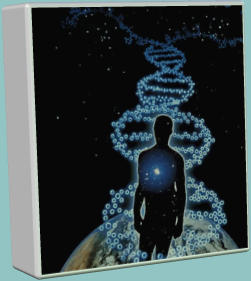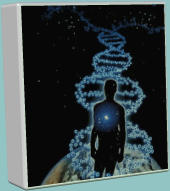The Improbability of Evolution
Life,
and
the
world
which
makes
it
possible,
are
incredibly
complex,
and
the
more
that
is
learned
about
either
only
makes
them
seem
more
so.
Indeed,
life
is
so
complex
that
the
brightest
minds
who
have
set
themselves
to
the
challenge
of
creating
it
artificially
have
been
unable
to
produce
the
most
minimalistic
forms
of
it.
Yet,
evolutionists
would
have
people
believe
that,
contrary
to
all
the
plain
evidence
of
their
eyes
and
minds,
not
only
something
literally
as
“dumb
as
dirt”
created
what
the
most
brilliant
scientists
could
not
create,
but
that
life
has
continually
acted
upon
itself
to
create
increasingly
more
complex forms.
Thus,
life’s
very
complexity,
for
which
evolution
strains
itself
to
account,
renders
evolution
improbable
as
an
explanation
for
life
as
it
exists.
It
is
probably
impossible
to
measure
the
improbability
of
evolution,
but
that
is
hardly
necessary.
Any
honest
person
who
compares
what
he
is
asked
to
believe
about
evolution
with
what
he
sees
all
around
him
almost
immediately
and
intuitively
questions
its
credibility.
All
others
succumb
to
personal
preference
or
peer
pressure.
This
might
be
why
scientists
find
it
so
frustrating
that,
after
at
least
150
years,
they
have
not
been
able
to
convince
so
many,
perhaps
hundreds
of
millions
of,
otherwise
reasonably
intelligent
people
of
the
veracity
of
evolution,
despite
subjecting
them
to
a
brain-washing
deluge
of
propaganda
from virtually all media and academic sources.
Perhaps
the
reason
for
their
failure
is
given
by
David
Berlinski,
an
agnostic
mathematician
who
holds
a
Ph.D.
from
Princeton
University,
who
said
in
his
book,
The
Devil’s
Delusion
:
“The
idea
that
human
beings
have
been
endowed
with
powers
and
properties
not
found
elsewhere
in
the
animal
kingdom
—
or
the
universe,
so
far
as
we
can
tell
—
arises
from
a
simple
imperative:
Just
look
around
.
It
is
an
imperative
that
survives
the
invitation
fraternally
to
consider
the
great
apes.
The
apes
are,
after
all,
behind
the
bars
of
their
cages
and we are not.”
That
is
really
about
all
it
takes
to
know
that
evolution
is
not
true.
Evolutionists
have
simply
not
been
able
to
overcome
the
overwhelming
evidence
of
the
senses
as
judged
by
nothing
more
than
common
sense.
In
fact,
to
know
that
it
is
God,
and
not
the
world
itself,
who
made
the
world,
the
Bible
simply
tells
people
to
use
their
common
sense
to
draw
a
conclusion
from
what
they
see
around
them:
“And
yet
He
did
not
leave
Himself
without
witness,
in
that
He
did
good
and
gave
you
rains
from
heaven
and
fruitful
seasons,
satisfying
your hearts with food and gladness” (Acts 14:17). In other words, “just look around.”
A
few
more
examples
strengthen
this
point.
First,
if
life,
as
evolution
claims,
has
passed
through
innumerable
iterations,
each
one
barely
distinguishable
from
the
last,
how
is
it
that
life
exists
in
so
many
discrete
forms?
Where
is
the
reptile
with
breasts
or
the
mammal
with
feathers?
Second,
how
does
the
fourth
generation
of
the
monarch
butterfly
which
left
its
home
in
central
Mexico
know
how
to
migrate
between
there
and
Canada
using
the
same
route
and
trees and to return to the same place its forebears used but which it has never seen?
What
makes
human
cells,
which
have
precisely
the
same
genome
after
fertilization,
subdivide and differentiate themselves into hundreds of kinds of cells?
Looked at this way, why should evolution as a creator be any more probable than God?

“For
the
wrath
of
God
is
revealed
from
heaven
against
all
ungodliness
and
unrighteousness
of
men,
who
suppress
the
truth
in
unrighteousness,
because
that
which
is
known
about
God
is
evident
within
them;
for
God
made
it
evident
to
them.
For
since
the
creation
of
the
world
His
invisible
attributes,
His
eternal
power
and
divine
nature,
have
been
clearly
seen,
being
understood
through
what
has
been
made,
so
that
they
are
without
excuse” (Romans 1:18-20).









“For
the
wrath
of
God
is
revealed
from
heaven
against
all
ungodliness
and
unrighteousness
of
men,
who
suppress
the
truth
in
unrighteousness,
because
that
which
is
known
about
God
is
evident
within
them;
for
God
made
it
evident
to
them.
For
since
the
creation
of
the
world
His
invisible
attributes,
His
eternal
power
and
divine
nature,
have
been
clearly
seen,
being
understood
through
what
has
been
made,
so
that they are without excuse” (Romans 1:18-20).
The Improbability of Evolution
Life,
and
the
world
which
makes
it
possible,
are
incredibly
complex,
and
the
more
that
is
learned
about
either
only
makes
them
seem
more
so.
Indeed,
life
is
so
complex
that
the
brightest
minds
who
have
set
themselves
to
the
challenge
of
creating
it
artificially
have
been
unable
to
produce
the
most
minimalistic
forms
of
it.
Yet,
evolutionists
would
have
people
believe
that,
contrary
to
all
the
plain
evidence
of
their
eyes
and
minds,
not
only
something
literally
as
“dumb
as
dirt”
created
what
the
most
brilliant
scientists
could
not
create,
but
that
life
has
continually
acted
upon
itself
to
create
increasingly
more
complex
forms.
Thus,
life’s
very
complexity,
for
which
evolution
strains
itself
to
account,
renders
evolution
improbable
as
an
explanation
for
life
as
it
exists.
It
is
probably
impossible
to
measure
the
improbability
of
evolution,
but
that
is
hardly
necessary.
Any
honest
person
who
compares
what
he
is
asked
to
believe
about
evolution
with
what
he
sees
all
around
him
almost
immediately
and
intuitively
questions
its
credibility.
All
others
succumb
to
personal
preference
or
peer
pressure.
This
might
be
why
scientists
find
it
so
frustrating
that,
after
at
least
150
years,
they
have
not
been
able
to
convince
so
many,
perhaps
hundreds
of
millions
of,
otherwise
reasonably
intelligent
people
of
the
veracity
of
evolution,
despite
subjecting
them
to
a
brain-washing
deluge
of
propaganda from virtually all media and academic sources.
Perhaps
the
reason
for
their
failure
is
given
by
David
Berlinski,
an
agnostic
mathematician
who
holds
a
Ph.D.
from
Princeton
University,
who
said
in
his
book,
The
Devil’s
Delusion
:
“The
idea
that
human
beings
have
been
endowed
with
powers
and
properties
not
found
elsewhere
in
the
animal
kingdom
—
or
the
universe,
so
far
as
we
can
tell
—
arises
from
a
simple
imperative:
Just
look
around
.
It
is
an
imperative
that
survives
the
invitation
fraternally
to
consider
the
great
apes.
The
apes
are,
after
all,
behind
the
bars
of
their
cages
and
we
are
not.”
That
is
really
about
all
it
takes
to
know
that
evolution
is
not
true.
Evolutionists
have
simply
not
been
able
to
overcome
the
overwhelming
evidence
of
the
senses
as
judged
by
nothing
more
than
common
sense.
In
fact,
to
know
that
it
is
God,
and
not
the
world
itself,
who
made
the
world,
the
Bible
simply
tells
people
to
use
their
common
sense
to
draw
a
conclusion
from
what
they
see
around
them:
“And
yet
He
did
not
leave
Himself
without
witness,
in
that
He
did
good
and
gave
you
rains
from
heaven
and
fruitful
seasons,
satisfying
your
hearts
with
food
and
gladness” (Acts 14:17). In other words, “just look around.”
A
few
more
examples
strengthen
this
point.
First,
if
life,
as
evolution
claims,
has
passed
through
innumerable
iterations,
each
one
barely
distinguishable
from
the
last,
how
is
it
that
life
exists
in
so
many
discrete
forms?
Where
is
the
reptile
with
breasts
or
the
mammal
with
feathers?
Second,
how
does
the
fourth
generation
of
the
monarch
butterfly
which
left
its
home
in
central
Mexico
know
how
to
migrate
between
there
and
Canada
using
the
same
route
and
trees
and
to
return
to
the
same place its forebears used but which it has never seen?
What
makes
human
cells,
which
have
precisely
the
same
genome
after
fertilization,
subdivide
and
differentiate
themselves
into
hundreds
of kinds of cells?
Looked
at
this
way,
why
should
evolution
as
a
creator
be
any
more probable than God?









